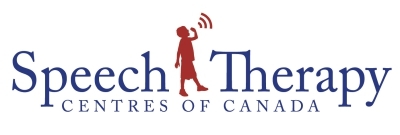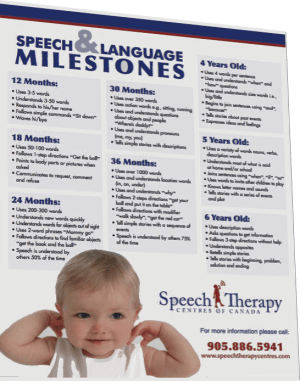When a child has difficulty with speech and/or language, parents often get all sorts of (well meaning!) advice: “Wait it out”, “He’s a late bloomer”, “She’ll get it eventually”. When should you start to consider the involvement of a speech-language pathologist?
The following is a list of ages and stages for certain sounds and grammatical concepts, as well as the age at which treatment is indicated. Whenever you’re in doubt, ask a speech-language pathologist: he/she has the training required to identify when children should begin treatment and for how long other children can wait.
Ages and Stages: Articulation (How our lips, tongue, and teeth come together to make speech sounds)
Sounds that should have developed by 3 years: p, b, m, t, d, n, h, w, vowels (a, e, i, o, u)
Age for concern? 3 years and over
Sounds that should have developed by 3-3 ½ years: k, g, ing, f, s, y, s-blends
Age for concern? 3 ½ years
Sounds that should have developed by 3 ½ -4 years: z, sh, l
Age for concern? 4 years
Sounds that should have developed by 4-5 years: l-blends, ch, j
Age for concern? 5 years
Sounds that should have developed by 5 years +: v, r, r-blends, th
Age for concern? 5 ½ – 6 years
Ages and Stages: Language (How our brain understands and puts together strings of words in sentences)
Grammar concepts that should have developed by 3 years: early pronouns
Age of concern: 3 years +
Grammar concepts that should have developed by 3-3 ½ years: regular plurals (s, -es), possessives (‘s) auxiliary/copula (is/are), present progressive (-ing), early prepositions (in, on, under)
Age for concern? 3 ½ years
Grammar concepts that should have developed by 4 years: pronouns (he/she/they), 3rd person singular(-s)
Age for concern? 4 years
Grammar concepts that should have developed by 4-5 years: possessive pronouns (his/hers/theirs), objective pronouns (him/her/them), later prepositions (behind, in front, beside), regular past tense (-ed)
Age for concern? 5 years
Grammar concepts that should have developed by 5 years +: future tense (will), irregular past tense (ate, drank…)
Age for concern? 5 ½ – 6 years
If you’ve identified any of these concern areas you may consider a speech therapy assessment to determine the best course of action.
Written by: Jessica Goldberg, Speech-Language Pathologist, The Speech Therapy Centres of Canada Ltd.

